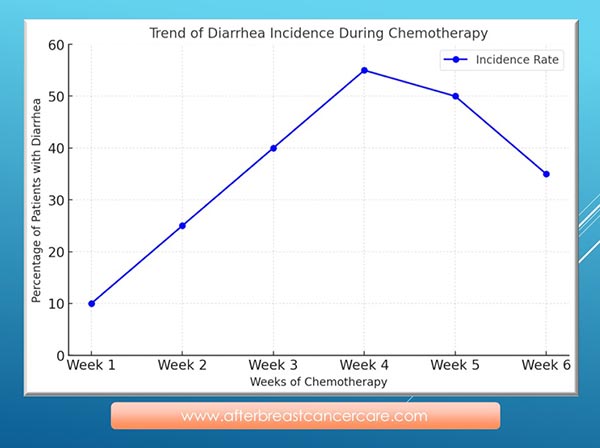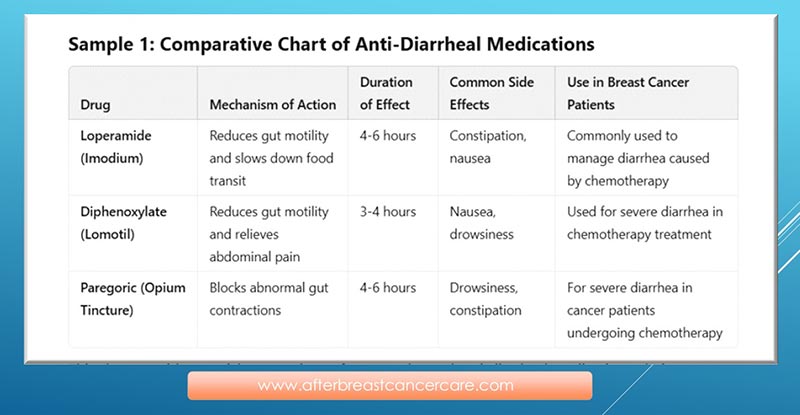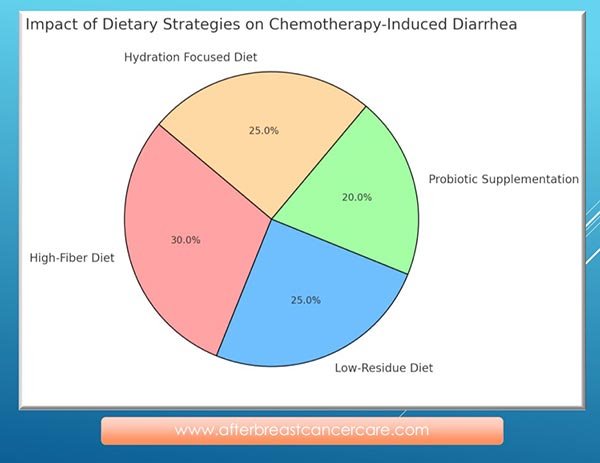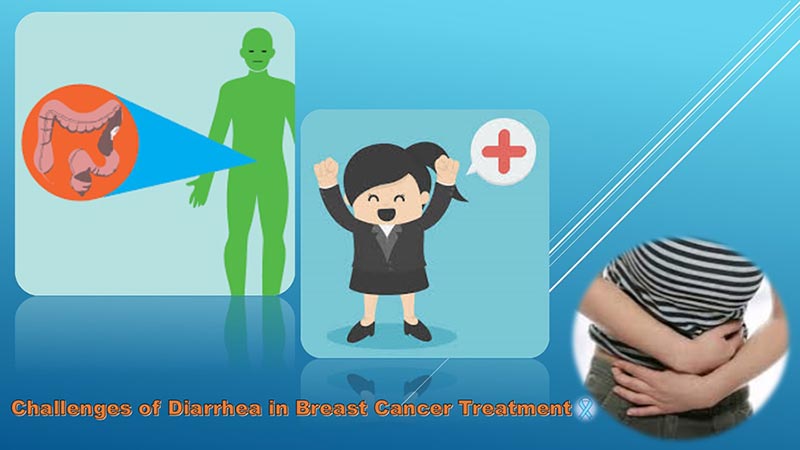Challenges of Diarrhea in Breast Cancer Treatment: Causes, Management Approaches, and Maintaining Quality of Life During Recovery
In the course of breast cancer treatment, patients face numerous challenges, each of which can have profound effects on their quality of life and recovery process. One common and unpleasant issue that patients may encounter is diarrhea, which, as a frequent side effect of cancer treatments such as chemotherapy, radiation therapy, and hormonal medications, significantly impacts the digestive system. This gastrointestinal issue not only causes physical discomfort but also adds to the emotional burden of patients, complicating the treatment process. Although diarrhea is temporary in some cases, for others, it may become a chronic problem that requires careful management and special care. In this article, we aim to address common questions and concerns that many breast cancer patients have regarding diarrhea as a treatment side effect. From the causes of this gastrointestinal issue to effective management strategies, our goal is to provide accurate and practical information to help patients navigate their treatment with more confidence and enjoy a better quality of life.
Which Treatments Cause Diarrhea in Breast Cancer Patients?
Various treatments used for breast cancer can damage the gastrointestinal tract and lead to diarrhea. Some of these treatments include:
- Chemotherapy: Chemotherapy drugs can affect healthy cells in the digestive system, particularly in the intestines. These drugs may cause inflammation and damage to the intestines, resulting in diarrhea. In addition, certain chemotherapy drugs like 5-fluorouracil (5-FU) and taxol are particularly known to cause diarrhea.
- Radiation Therapy: Radiation therapy, especially when administered to the chest area, can impact the intestines and other parts of the digestive system. The inflammation caused by radiation can lead to diarrhea.
- Hormonal Treatments: Medications used to reduce or stop the production of hormones, such as tamoxifen or aromatase inhibitors, may have gastrointestinal side effects, including diarrhea.
Can Chemotherapy Cause Diarrhea?
Yes, chemotherapy can be one of the primary causes of diarrhea in breast cancer patients. The chemotherapy drugs used to fight cancer cells can also damage healthy cells in the intestines. This damage can lead to inflammation, altered bowel movements, and ultimately, diarrhea.
Chemotherapy typically affects the intestines in two ways:
- Damage to the Intestinal Cells: Chemotherapy drugs can damage the cells lining the intestines, leading to inflammation and diarrhea.
- Changes in Gut Microbiota: Chemotherapy can disrupt the balance of gut flora, leading to an overgrowth of certain bacteria, which can also cause diarrhea.
Diarrhea may be temporary and improve after the completion of chemotherapy cycles, but for some individuals, it may persist for an extended period and require medical intervention. The chart below illustrates the progression of diarrhea over six weeks of chemotherapy. As shown, the incidence of diarrhea increases in the early weeks, peaks in the fourth week, and then begins to decrease.

How Can Diarrhea Caused by Chemotherapy in Breast Cancer Patients Be Prevented?
Managing diarrhea after breast cancer treatment is an essential part of the recovery process. Here are several key approaches to reducing and preventing diarrhea:
- Use of Anti-Diarrheal Medications: Medications such as loperamide (Imodium) or diphenoxylate (Lomotil) can reduce the frequency and severity of diarrhea. These drugs slow down bowel movements and prevent excessive fluid loss.
- Following a Proper Diet: Consuming low-fiber, easily digestible foods helps reduce irritation in the intestines. Foods like white rice, boiled potatoes, skinless chicken, and fish are suitable. It is important to avoid fatty, fried, or spicy foods.
- Preventing Dehydration: Severe diarrhea can lead to dehydration. To prevent this, it is important to drink enough fluids, such as water, low-fat soups, and electrolyte-rich drinks. Electrolyte solutions can also be used to replace lost minerals.
- Adequate Rest: Resting helps the body accelerate its recovery. Sufficient rest and relaxation can be beneficial in alleviating gastrointestinal symptoms.
- Skin Care: Diarrhea can irritate the skin, especially in the areas around the anus. Using soothing creams and maintaining proper hygiene can help prevent skin problems. For a more in-depth look at this topic, please refer to this article.

This chart provides a quick comparison of common anti-diarrheal medications, their mechanisms of action, and their relevance to breast cancer patients undergoing treatments such as chemotherapy.
What Factors Cause Diarrhea in Cancer Patients?
Diarrhea in cancer patients is usually caused by several factors, including:
- Side Effects of Treatments: Chemotherapy and radiation therapy can damage the gastrointestinal tract and lead to diarrhea.
- Changes in Gut Microbiota: Cancer treatments can alter the gut microbiome, which can result in diarrhea.
- Psychological Stress: Concerns and stress related to the illness and treatment can impact the digestive system. According to a report on the website cancer.gov, ” Being diagnosed with cancer and undergoing treatment often leads to stress and anxiety, which are common triggers for diarrhea.”
When Should You Be Concerned About Diarrhea During Breast Cancer Treatment?
If diarrhea persists for more than a few days or worsens during breast cancer treatment, it requires special attention. If diarrhea is accompanied by symptoms such as unusual weight loss, fever, rectal bleeding, or abdominal pain, it may indicate more serious issues that require immediate medical evaluation. Especially in patients undergoing chemotherapy or radiation therapy, gastrointestinal changes could be due to side effects of the treatments or intestinal infections that require specialized care. Additionally, in patients with metastatic breast cancer, diarrhea could be a sign of the disease affecting the digestive system. Therefore, if there is any sudden change or intensification in diarrhea, prompt medical consultation is essential.
What Foods Are Beneficial for Reducing Diarrhea During Breast Cancer Treatment?
During breast cancer treatment, it is strongly recommended to consume foods that do not harm the intestines and are easily digestible. The following foods can help reduce diarrhea:
- White Rice and Pasta: These foods are easy to digest and do not irritate the intestines. Consuming them can help reduce diarrhea.
- Boiled or Mashed Potatoes: Potatoes are one of the best options for patients with diarrhea because they are low in fiber, soft, and can help support the digestive system.
- Cooked Chicken or Fish: These protein sources are easily digestible and can help strengthen the body without irritating the digestive system.
- Plain Yogurt or Kefir: These foods contain probiotics that can help regulate the digestive system and alleviate diarrhea symptoms.
Look at the chart below. This pie chart illustrates the impact of different diets on controlling chemotherapy-induced diarrhea.

Psychological Management During Breast Cancer Treatment
In addition to managing physical symptoms like diarrhea, attention to the patient’s psychological well-being is essential. Stress and anxiety caused by the illness and treatment can significantly impact gastrointestinal health. Many patients may experience anxiety related to the disease, which in turn exacerbates gastrointestinal symptoms like diarrhea. To help reduce these stresses:
- Relaxation exercises such as deep breathing and meditation can help alleviate anxiety.
- Social support from friends and family plays a vital role in improving the patient’s mood.
- Psychological counseling to manage anxiety and depression during this time can be beneficial.
Can Dietary Changes Help Improve Diarrhea?
Yes, dietary changes can have a significant impact on controlling diarrhea. Consuming foods that are easier to digest and low in fiber can help reduce bowel irritation. Additionally, adjusting the types of fluids consumed can aid in preventing dehydration.
Here are some fluids that can help reduce diarrhea symptoms and prevent dehydration:
- Water:
- Water is the best and most essential choice for maintaining hydration. Diarrhea can cause significant fluid loss, and a breast cancer patient undergoing treatment must drink water regularly to prevent dehydration.
- Some treatments, such as chemotherapy, may reduce the sense of thirst, but the patient should continue drinking water.
- Electrolyte Drinks (ORS Solutions):
- These drinks are very beneficial as they help replace lost electrolytes. Patients undergoing chemotherapy, radiation therapy, or hormone therapy may be at higher risk of dehydration and electrolyte disturbances.
- ORS solutions are particularly useful after severe or prolonged diarrhea.
- Diluted Fruit Juices:
- Natural fruit juices like diluted apple juice can be helpful for patients as they assist in keeping the body hydrated and are less likely to irritate the intestines.
- However, it is recommended to dilute these juices, as natural sugars in high amounts can worsen diarrhea.
- Simple Soups and Broths:
- Simple soups, especially low-fat chicken soup or vegetable broth, can be beneficial for breast cancer patients with diarrhea. These soups not only provide hydration but also supply essential nutrients important for the healing process.
- It is advisable to avoid fatty or spicy soups as they may irritate the intestines further.
- Mild Herbal Teas:
- Herbal teas such as chamomile or ginger tea can help reduce intestinal inflammation and soothe the digestive system. These teas are usually gentle and suitable for individuals with gastrointestinal issues like diarrhea.
- These teas have mild effects and, due to their anti-inflammatory properties, can help alleviate digestive symptoms.

Important Notes for Breast Cancer Patients with Diarrhea:
- Be mindful of digestive sensitivity: Some cancer treatments may make the digestive system more sensitive. Therefore, patients should avoid liquids with irritating effects.
- Monitor fluids and foods: If the patient experiences severe or prolonged diarrhea, it’s best to consult with a doctor or nutritionist to select a more suitable diet and fluids tailored to their specific condition.
In general, the fluids mentioned, when carefully chosen with the patient’s specific condition in mind, can be beneficial for managing diarrhea in breast cancer patients undergoing treatment. It is important to avoid drinks containing caffeine, alcohol, or artificial sweeteners (such as sorbitol), as these can exacerbate diarrhea. The goal of dietary changes in fluids is to maintain body hydration, replenish electrolytes, and reduce bowel irritation.
Can Metastatic Breast Cancer Cause Chronic Diarrhea?
Yes, metastatic breast cancer can cause chronic diarrhea due to the effects of treatments and also as a result of the cancer spreading to the gastrointestinal system. This type of diarrhea usually requires more complex treatments and may persist for a long time.
How Can Chronic Diarrhea Caused by Metastatic Breast Cancer Be Treated?
For patients with metastatic breast cancer who experience chronic diarrhea, in addition to standard treatments for controlling diarrhea, attention to the underlying causes is crucial. If the diarrhea is caused by the spread of cancer to the gastrointestinal system, specific treatments such as targeted therapies or immunotherapies may be needed. These therapies directly attack cancer cells and have fewer side effects on the gastrointestinal system. Additionally, certain anti-cancer drugs or systemic treatments, such as anti-VEGF (vascular endothelial growth factor) drugs, may be useful for managing or reducing diarrhea. These treatments can help improve the patient’s condition by inhibiting processes that cause gastrointestinal irritation. Moreover, in some patients, chronic bowel inflammation as a side effect of chemotherapy or radiation therapy may persist, requiring specific anti-inflammatory treatments or the use of biologic medications to reduce inflammation. These drugs can improve the quality of life for patients by reducing inflammation and improving nutrient absorption.
Can Diarrhea Be a Sign of Dangerous Complications?
Yes, diarrhea can be a sign of dangerous complications, especially if it is accompanied by other warning signs such as fever, unexplained weight loss, bleeding, or abdominal pain. These symptoms may indicate more serious problems in the gastrointestinal system. For example, bacterial or viral gastrointestinal infections can significantly affect digestive health and worsen diarrhea. Additionally, cancer treatments such as chemotherapy or radiation therapy can cause inflammation or damage to the intestines, potentially leading to severe or chronic diarrhea. Furthermore, in patients with advanced or metastatic cancer, the spread of the disease to various parts of the gastrointestinal system may result in chronic diarrhea or bleeding. Therefore, if any changes occur in the condition of diarrhea along with unusual symptoms, it is essential to consult a doctor immediately to identify the underlying cause and receive appropriate treatment.
Are There Specific Treatments to Stop Diarrhea After Chemotherapy?
Yes, anti-diarrheal medications, probiotic therapies, and specific dietary regimes can help reduce diarrhea following chemotherapy. In some cases, doctors may prescribe medications to control inflammation and bowel irritation. Besides standard anti-diarrheal drugs, some complementary treatments, such as consuming foods with soothing and anti-inflammatory properties, can also be beneficial for managing diarrhea, especially in cases where gastrointestinal irritation has intensified.

When Should I See a Doctor if Diarrhea Persists After Chemotherapy?
If diarrhea persists or worsens after chemotherapy, you should consult a doctor. It’s especially important to seek immediate medical attention if symptoms such as bleeding, fever, or abdominal pain are present. If you experience signs of dehydration, like dry mouth, decreased urination, or dizziness, you should also contact a healthcare provider. According to breastcancer.org: “If someone is having a lot of diarrhea and is having trouble eating or particularly drinking, or if they’re getting dizzy, call the doctor’s office immediately.”
Additionally, as highlighted by lbbc.org: ” The most important step is to report diarrhea to your doctor. Let them know how much you are experiencing, how you feel, and how it is affecting your life. They will work with you to find an option that is best for your health.”
Final Thoughts
The journey through breast cancer treatment can often feel like losing control over your life. One of the more uncomfortable challenges you may face is diarrhea resulting from treatments. This issue not only affects your body but can also impact your emotional well-being. However, it’s important to know you are not alone, and with understanding, you can overcome this.
Here are some key points that can help you on this journey:
- Learn About Treatment Side Effects: Diarrhea is a common side effect of breast cancer treatments, and understanding this can help alleviate some of the fear and anxiety. There are specific treatments available to manage it, which your doctor can prescribe.
- Care for Your Body: Your body is fighting, and it needs special attention. Using anti-diarrheal medications, drinking enough fluids, and taking care of your diet can help improve your condition. But most importantly, listen to your body. If you feel something is wrong, contact your doctor right away.
- Emotional Support: Diarrhea and other treatment side effects can put a lot of psychological pressure on you. This pressure may sometimes lead to feelings of loneliness or despair. In such moments, lean on the support of family, friends, and support groups. Talking to others who have experienced similar situations can provide immense comfort.
- Hope and Strength: Remember, every day you get through brings you one step closer to recovery. Breast cancer treatment is a long and difficult journey, but at every stage, you fight like a warrior. Diarrhea and other issues are temporary, and with proper management, you can return to your daily life. Your hope and determination are your most powerful weapons in this fight.
Ultimately, remember that cancer treatment does not mean you’re alone. You are supported by a team of healthcare professionals, as well as family and friends. Together, you can overcome these challenges and achieve greater health and peace. Believe in yourself, and never forget that you are stronger than you think.

